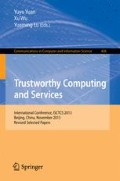Abstract
With the growing demand for accelerating large scale web access, web proxy cache is widely used. To make full use of computing resource and bandwidth of proxy cache nodes, weak cache consistency is the best choice in most cases. Traditional refreshing methods like Adaptive TTL will cause high invalidate rate of web pages. We introduce a new effective way to decrease the invalidate rate of frequently queried objects in weak consistency scheme. Based on Zipfs law, our method focuses on giving the hotspot objects more priorities during cache refreshing process, which reduces the invalidate rate on hotspot objects by paying less concentration on the less frequently queried objects.
Access this chapter
Tax calculation will be finalised at checkout
Purchases are for personal use only
References
Breslau, L., Cao, P., Fan, L., Phillips, G., Shenker, S.: Web caching and Zipf-like distributions: evidence and implications. INFOCOM ’99, Vol. 1, pp. 126–134 (1999)
Spanoudakis, M., Lorentzos, D., Anagnostopoulos, C., Hadjiefthymiades, S.: On the use of optimal stopping theory for cache consistency checks. In: 2012 16th Panhellenic Conference IEEE Informatics (PCI), pp. 327–332 (2012)
Gwertzman, J., Seltzer, M.: World wide web cache consistency. In: USENIX Annual Technical Conference, pp. 141–152 (1996)
Cao, P., Liu, C.: Maintaining strong cache consistency in the world wide web. IEEE Trans. Comput. 47(4), 445–457 (1998)
Li, X., Qiu, F., Zhou, H., Zhang, H., You, I.: Maintaining strong consistency for the identifier-to-locator mapping cache. In: 2012 IEEE Globecom Workshops (GC Wkshps), pp. 986–991 (2012)
Krishnamurthy, B., Wills, C.E.: Study of piggyback cache validation for proxy caches in the world wide web. In: USENIX Symposium on Internet Technologies and Systems, p. 38 (1997)
Barish, G., Obraczke, K.: World wide web caching: trends and techniques. IEEE Commun. Mag. 38(5), 178–184 (2000)
Wang, J.: A survey of web caching schemes for the internet. ACM SIGCOMM Comput. Commun. Rev. 29(5), 36–46 (1999)
Acknowledgement
This work was supported by the National High-Tech Research and Development Plan 863 of China under Grant No. 2011AA010703, the Strategic Priority Research Program of the Chinese Academy of Sciences under Grant No. XDA06030200, and the National Natural Science Foundation under Grant No. 61070026.
Author information
Authors and Affiliations
Corresponding author
Editor information
Editors and Affiliations
Rights and permissions
Copyright information
© 2014 Springer-Verlag Berlin Heidelberg
About this paper
Cite this paper
Chen, C., Liu, Q., Sha, H., Zhou, Z., Zheng, C. (2014). A New Approach to Decrease Invalidate Rate of Weak Consistency Methods in Web Proxy Caching. In: Yuan, Y., Wu, X., Lu, Y. (eds) Trustworthy Computing and Services. ISCTCS 2013. Communications in Computer and Information Science, vol 426. Springer, Berlin, Heidelberg. https://doi.org/10.1007/978-3-662-43908-1_14
Download citation
DOI: https://doi.org/10.1007/978-3-662-43908-1_14
Published:
Publisher Name: Springer, Berlin, Heidelberg
Print ISBN: 978-3-662-43907-4
Online ISBN: 978-3-662-43908-1
eBook Packages: Computer ScienceComputer Science (R0)

